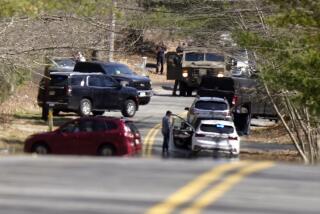Spy Tells Senators Ways to Curb Loss of Secrets
- Share via
WASHINGTON — Confessed spy James D. Harper Jr. told a Senate subcommittee Tuesday that Congress could help stop leaks of U.S. secrets by imposing stricter passport controls on persons holding security clearances, maintaining closer surveillance of their financial and emotional problems, stepping up reviews of clearances and using lie detectors more frequently. Such controls could have prevented his espionage, said Harper, a Silicon Valley engineer who was given a life sentence last year for selling defense information to Polish intelligence agents for $250,000.
Harper testified before the Senate Governmental Affairs subcommittee on investigations in the wake of an extraordinary series of four spying arrests in five days.
Bail Plea Rejected
In one of the cases, a federal magistrate Tuesday rejected a plea by Anne L. Henderson-Pollard to be released on bail until a grand jury considers charges that she passed secret documents to an unauthorized person. U.S. Magistrate Patrick Attridge said evidence supports “reasonable inferences” that the wife of Jonathan Jay Pollard, a naval intelligence official charged with spying for Israel, planned to deliver classified information to China.
Harper, flanked by two attorneys, declared that he now regrets having betrayed his country. But he said he did not believe he was committing espionage at the beginning of his involvement with the Poles, when he delivered unclassified material.
Later, as he “realized the magnitude of what I was doing,” Harper said, he tried to make a deal with the Justice Department to act as a double agent and thereby gain immunity. But the attempt enabled FBI agents to catch him, and he confessed when a defecting Polish official threatened to confirm his guilt.
When asked by Sen. William S. Cohen (R-Me.) what could be done to “prevent future James Harpers,” he read the list of suggested controls.
Harper urged particularly that persons with security clearance who travel to Soviet-bloc nations be required to file an itinerary and undergo debriefings on their return. All his contacts with the Poles took place outside the United States, he recalled.
He recommended also that security officers be government employees, rather than private company employees, in cases in which classified information must be guarded at the workplace, that security indoctrination be more thorough and that outsiders’ “need to know” be better investigated.
Harper indicated that there had been little difficulty in his own entry into espionage. He said that his late wife, Ruby Louise Schuler, had been a secretary with “secret” security clearance in a Palo Alto firm conducting research on nuclear missiles and that she easily assembled quantities of documents for him to sell.
Earlier, Sen. Daniel Patrick Moynihan (D-N. Y.), a member of the Senate Intelligence Committee, urged the subcommittee to support a measure he is sponsoring that would require the President to order foreign diplomats to halt electronic eavesdropping on U.S. communications and expel them if they refused to comply.
Staff writer Michael Wines also contributed to this story.
More to Read
Sign up for Essential California
The most important California stories and recommendations in your inbox every morning.
You may occasionally receive promotional content from the Los Angeles Times.













